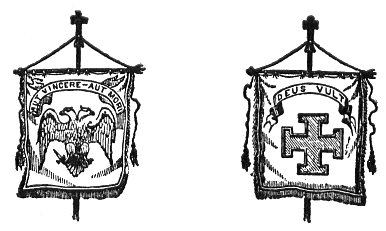But should there be found among the number of Knights men who of themselves dive into the meaning of that great Revolution which only deprived man of his primitive dignity by subjecting him to the laws of civil society, should they have comprehended the meaning of this other Revolution, which is to restore every thing by re-establishing man in his primitive independence, such men will be pointed out by the Scrutators. It is at them that the Code particularly aims when it says, Let the Scotch Knights seriously reflect, that they are presiding over a grand establishment, whose object is the happiness of mankind. In short, these Knights have to act the parts of Superiors in the Order; they are the Inspectors or the Directors of all the preparatory class. They have on that account assemblies peculiar to themselves, called Secret Chapters. The first duty of these chapters is to watch over the interests of the Order within their district. “The Scotch Knights,” says their first instruction, “are to pay particular attention to the discovery of any plans which may contribute to fill the coffers of the Order. It were much to be wished that they could devise means of putting the Order into possession of some considerable revenues in their province.—He that shall have rendered so signal a service must never hesitate at believing that these revenues are employed in the most noble purposes.—The whole must labour with all their might to consolidate the edifice little by little within their district, until the finances of the Order shall be found to be competent to its views.” 11
The second part of the Code entrusts these Knights with the government of the preparatory class. Each Knight is to correspond with a certain number of Brethren who have the direction of the Minerval academies. The Code contains instructions which point out to them upon what objects they are permitted to decide; what Brethren they are to forward or thwart in their promotion; and what reports they are to make to their Superiors. In their correspondence with their Inferiors they make use of the common cypher, but when they write to the chiefs they employ a peculiar character which may truly be called Hieroglyphic.
p. 465
They are particularly charged with the inspection of the Major Illuminees. “The Scotch Knights,” says the Code, “shall be particularly attentive that the Major Illuminees do not neglect to mention in their monthly letters such employments as they may have to dispose of.” 12
I have shown, in the foregoing chapter, how useful and indeed how necessary this precaution proved for recompensing the zeal of the Brethren. The adept Knigge wished to demonstrate that it might be equally useful for princes, when combined with the scrutinizing Code. “Let us suppose,” says he, “that a Prince, having an Illuminee for his Minister, wishes to find a proper person to fill any vacant office; by means of the Scrutators, the Minister may immediately present the faithful portrait of divers personages, from among whom the Prince will only have to make his election.” 13—But every reader, I hope, will recollect, that in consequence of the oath that has been taken by the Minister to dispose of all places in favour of the Brethren, and that according to the direction of the Knights, he will only present such adepts for those offices as the Order shall have chosen; and thus will Illuminism soon dispose of all benefices, employments, and dignities, and have the entire direction of the whole power of the State.
Meanwhile, until the Sect shall exert this influence over Courts, the Scotch Knights are to acquire an absolute sway in the Masonic Lodges. Their laws on this head deserve particular attention. We shall select the following:
“In every town of any note situated within their district, the Secret Chapters shall establish Lodges for the three ordinary degrees, and shall cause men of sound morals, of good repute, and of easy circumstances, to be received in these Lodges. Such men are much to be sought after, and are to be made Masons, even though they should not be of any service to Illuminism in its ulterior projects.” 14

Moe is the founder of GnosticWarrior.com. He is a father, husband, author, martial arts black belt, and an expert in Gnosticism, the occult, and esotericism.




